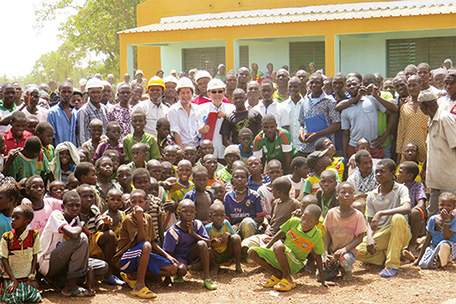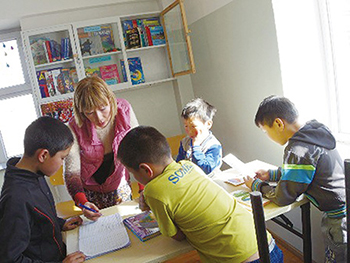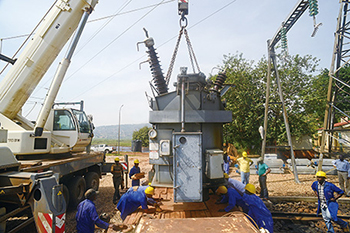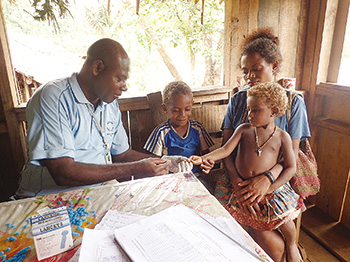Section 2 Overview and Significance of the 2030 Agenda for Sustainable Development
3. Japan’s Efforts

Staff members of a Dominican fishery cooperative control the freezing of mahi-mahi through fisheries management technical cooperation from Japan. (Photo: Kosuke Okahara / JICA)
The 2030 Agenda provides that all countries will implement this plan and its progress will be tracked. At the UN Sustainable Development Summit in September 2015 that adopted the 2030 Agenda, the leaders of not only developing countries but also many developed countries stated that they would incorporate the SDGs into their national development strategies and plans, and implement the 2030 Agenda domestically. Each country is working quickly to study the necessary mechanisms and concrete efforts to this end. The following introduces Japan’s basic policy regarding the implementation of the 2030 Agenda.

Mr. Shuichi Numata, general supervisor of the construction worksite of a Health and Social Promotion Center in Burkina Faso and Mr. Reona Nozaki, the locally-stationed supervisor and project manager, participate in a ceremony for handing-over the site to local people. (Photo: Shuichi Numata)
As described in Section 1, Japan has consistently and proactively contributed to the discussions and negotiations on the 2030 Agenda, even before the start of full-fledged international discussions. The fundamental principles incorporated into the 2030 Agenda, such as “people-centered” and “no one will be left behind,” reflect the human security principles that have been promoted globally under Japan’s leadership. It was also Japan that proposed the necessity of the Global Partnership. Likewise, Japan had proposed the development issues that were taken up in the SDGs, including women, health, education, disaster risk reduction, and quality growth. For all of these reasons Japan welcomes the adoption of the 2030 Agenda, and will put forth its best possible efforts to achieve the SDGs as a member of the Global Partnership.
Japan will carry this effort forward with the new Development Cooperation Charter established in February 2015 as a compass. It upholds the principles that have characterized Japan’s development cooperation for many years. The new Charter sets out a policy of cooperation for non-military purposes, assistance for self-help efforts, and promoting human security which focuses on each and every individual. At the same time, the new Charter presents that the Government of Japan would effectively address new issues facing the international community while strengthening its partnerships with the private sector, civil society, local governments, universities, and other actors. Thus, the Development Cooperation Charter already contains components that are essential for the implementation of the 2030 Agenda.

A Japan Overseas Cooperation Volunteer, Ms. Yoshie Tamai teaches children how to manage and maintain books at a library room established in a school dormitory in the province of Uvurkhangai, Mongolia. (Photo: Takako Tsukagoshi)
One of the priority issues in the Development Cooperation Charter that set the direction for Japan’s future development cooperation is “‘quality growth’ and poverty eradication through such growth.” “Quality growth” refers to economic growth encompassing: “inclusiveness,” allowing all individuals to enjoy the fruits of development without leaving anyone behind; “sustainability,” allowing for sustainable development to be achieved in the three dimensions of the economic, social, and environmental; and “resilience” to withstand risks, such as conflicts, natural disasters, and economic crises, through enhancing the capacities of individuals and communities as well as infrastructure development. This is exactly one of the goals that the 2030 Agenda seeks to achieve through the SDGs.
The Development Cooperation Charter underlines that Japan will promote development cooperation more proactively as a “Proactive Contributor to Peace” based on the principle of international cooperation, taking into consideration that various risks, including regional conflicts, terrorism, and fragile states, may seriously affect the economies of all countries, including Japan as well as developing countries. In addition, the Charter specifies that in a manner commensurate with a peace-loving nation, Japan will provide assistance for maintaining stability and security which form the foundation of prosperity. These efforts too are in alignment with what the 2030 Agenda aspires to achieve, which identifies Goal 16 as “Promote peaceful and inclusive societies for sustainable development” and sets concrete targets such as promoting the rule of law, combating organized crime, and providing assistance for building capacity to prevent violence and combat terrorism.

A construction worksite of a substation facility and an electrical distribution network in Kigali, Rwanda. (Photo: Takeshi Kuno / JICA)
The Development Cooperation Charter states that Japan will aim to build a sustainable and resilient international community through efforts to address global challenges that cannot be dealt with by a single country alone. Furthermore, the Charter lays out Japan’s intentions to promote “All-Japan” partnerships that include private companies, civil society, local governments and universities. It also presents Japan’s intention to deepen mutually beneficial partnerships between Japan and developing countries on an equal footing, as embodied in the term “development cooperation.” Building these partnerships based on the Development Cooperation Charter will contribute considerably to the Global Partnership that is considered indispensable to the implementation of the 2030 Agenda. This requires that the Japanese Government make further efforts to broaden and deepen understanding within Japan regarding the content and significance of the Development Cooperation Charter and the 2030 Agenda, as well as the underlying situation of global development.

Organized collection of blood samples conducted as part of malaria countermeasures in a village in Guadalcanal, the Solomon Islands. (Photo: Sayaka Oguri)
As described, under the Development Cooperation Charter, Japan, as a “Proactive Contributor to Peace” based on the principle of international cooperation, will more proactively carry out development cooperation that contributes to “quality growth” globally, making use of “All-Japan” partnerships that include the private and public sectors, NGOs, and local governments, by upholding principles such as human security and assistance for self-help efforts. Therefore, Japan will take a leading role in promoting quality infrastructure investment (note: see ODA Topics) not only in Asia, but also across the world including Africa. Additionally, Japan will promote the development of industrial human resources, a key driving force to achieve such growth, taking advantage of Japan’s high educational standards and advanced technology. Japan will also implement cooperation so as to ensure that no one will be left behind, placing focus on people in vulnerable situations. This will include efforts in sectors such as health, beginning with efforts to better prepare the international community for public health emergencies such as the Ebola virus disease outbreak and to promote universal health coverage (UHC)(Note 2) in every country, as well as education and assistance for women. Japan led the effort to adopt the World Tsunami Awareness Day (November 5) at the UN General Assembly in December 2015. To assist with the building of resilient societies and communities worldwide, Japan will continue to demonstrate leadership in the international community in the area of disaster risk reduction, including the implementation of the Sendai Framework for Disaster Risk Reduction adopted in March 2015 and enhancing tsunami-related outreach activities and countermeasures. With a view to realizing a sustainable environment and society, Japan will share with the world its knowledge on climate change efforts as well as on building a sound material-cycle society as epitomized by the concept of the 3Rs, “Reduce, Reuse, and Recycle.”(Note 3) Further still, Japan will make efforts for the economic development and stability of developing countries through providing assistance for peacebuilding, humanitarian assistance for refugees and others, law enforcement assistance including maritime security and border control measures, which will form the foundation of prosperity in Japan and the rest of the world.
It is expected that Japan’s efforts of this kind based on the Development Cooperation Charter will contribute significantly to the implementation of the 2030 Agenda by the entire international community.
- Note 2: UHC refers to basic health services that can be accessed at affordable cost whenever necessary throughout the lifetime of all people. Japan has identified the promotion of UHC as a key policy target since establishing Japan’s Strategy on Global Health Diplomacy in 2013.
- Note 3: The 3Rs refer to the “reduction of waste, reuse of resources and products, and recycle.”
